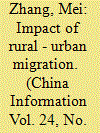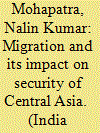| Srl | Item |
| 1 |
ID:
142823


|
|
|
|
|
| Summary/Abstract |
This study examines how remittances can influence economic growth under different levels of financial development. Using a dynamic panel estimation of 33 top remittance-recipient developing countries from 1979 to 2011, the results suggest that financial development neither works as a substitute nor a complement for the remittance–growth nexus. While remittances are effective in promoting economic growth, the influence of financial variables is found to be insignificant. More developed financial systems may attract more remittances; however, the interaction effect of financial development and remittances is not growth enhancing. Promoting financial literacy, reducing the cost of sending remittances through banks and encouraging the overall use of formal financial institutions may induce a stronger remittance–growth nexus.
|
|
|
|
|
|
|
|
|
|
|
|
|
|
|
|
| 2 |
ID:
170097


|
|
|
|
|
| Summary/Abstract |
This study pioneers the application of the New Economics of Labor Migration theory to outline and estimate two opposite effects of labor loss driven by the migration and remittances of adult children on the health of left-behind elderly parents through the changing rural market constraints. We use China's rural household survey data and simultaneous equation econometric techniques to estimate the effects of migration on the physical and mental health of left-behind elders. Results indicate that the loss of labor due to migration has a significantly negative effect on the health of left-behind elders, but remittances from migrants can compensate for the adverse effect. This study provides a comprehensive understanding that remittances from migration relax the constraints on household resource allocations in undeveloped rural areas with imperfect market conditions. Overall, left-behind elderly parents benefit from migrant children both physically and mentally.
|
|
|
|
|
|
|
|
|
|
|
|
|
|
|
|
| 3 |
ID:
098334


|
|
|
|
|
| Publication |
2010.
|
| Summary/Abstract |
As a result of China's marketization in recent years there has been an enormous number of rural-urban migrants. Based on a case study in poor villages on the Loess Plateau of central China, and referring to the overall framework of migration theories, this article examines the social and economic characteristics of migrants and their households, and discusses to what extent rural- urban migration contributes to the social and economic development of the migrant-sending areas, especially in reducing poverty
|
|
|
|
|
|
|
|
|
|
|
|
|
|
|
|
| 4 |
ID:
120732


|
|
|
|
|
| Publication |
2013.
|
| Summary/Abstract |
Migration is emerging as an important source of threat to the peace and security of Central Asia. This is happening, notwithstanding the fact that this region is receiving substantial amount of external remittance. Apart from lack of economic opportunities, existence of blurred boundaries, emergence of authoritarian regimes with a tilt towards strong 'ethnic state' as well as the alienation of substantial number of population are contributing to the process of flow of illegal migration. This results in loss of young population, growing ethno-nationalistic conflict, spurt in religious terrorism, proliferation of narco-trafficking as well as HIV/AIDS in this region. These above-mentioned threats are generating a lot of 'insecurity' in Central Asia. The best way to meet the challenges posed by migration is to ensure 'sustainable security' in this region by adopting a broader approach ranging from cooperation among the states of this region so also to ensure human security at the ground level.
|
|
|
|
|
|
|
|
|
|
|
|
|
|
|
|
| 5 |
ID:
113002


|
|
|
|
|
| Edition |
2nd ed.
|
| Publication |
Washington, DC, World Bank, 2011.
|
| Description |
xix, 264p.Pbk
|
| Standard Number |
9780821382189
|
|
|
|
|
|
|
|
|
|
|
|
Copies: C:1/I:0,R:1,Q:0
Circulation
| Accession# | Call# | Current Location | Status | Policy | Location |
| 056608 | 338.542091724/WOR 056608 | Main | On Shelf | Reference books | |
|
|
|
|
| 6 |
ID:
190895


|
|
|
|
|
| Summary/Abstract |
This commentary discusses Bangladesh’s interactions with Middle East countries, particularly focusing on the Gulf Cooperation Council (GCC) and Turkey. Although Bangladesh’s relations with the GCC are seemingly and dominantly economic, there is a significant level of cultural interconnectedness as well, especially with Saudi Arabia. In Bangladesh–Turkey relations, there is also a similar type of cultural attachment operating via each country’s religious identities. This attachment, especially in the last decade, was bolstered by deepening cooperation in counterterrorism activities and further economic interactions. The interactions with these Middle Eastern countries are not only important to Bangladesh’s foreign policy and economy but also to assuage some domestic tensions.
|
|
|
|
|
|
|
|
|
|
|
|
|
|
|
|